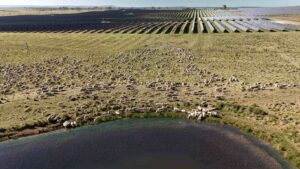Dozens of countries detailed new pledges to reduce emissions and drive green investment during a Climate Ambition Summit held over the weekend, without the participation of Australia after organisers saw through the hollow climate change rhetoric of the Morrison government.
A total of 75 national leaders met virtually on Saturday to participate in the summit, held in the place of postponed annual UN-sponsored international climate talks known as the Conference of the Parties (COP).
It was designed to provide a platform for counties to announce new targets and policies in response to the growing threat of global warming and many of the countries – although not all – used the summit to announce stronger action to address climate change and support increased investments in clean energy technologies.
Following the summit, 24 countries and the European Union have now formally adopted zero emissions targets, including most of Australia’s major trading partners, with several more countries making commitments to transition to 100 per cent renewable electricity.
During the summit, Denmark announced an end to oil and gas exploration, India announced that it would target a massive 450GW of installed renewable capacity by 2030 and Canada announced that it would ramp up its carbon price to C$170 (A$175) per tonne by 2030.
The United Kingdom, which co-hosted the summit and will host the next round of international climate negotiations in Glasgow late next year, announced ahead of the summit that it would set a target to reduce emissions by 68 per cent by 2030. The EU has now agreed to cut its emissions by 55 per cent by 2030. Australia is stuck at 26-28 per cent from 2005 levels, a date chosen for its unusually high emissions.
UK prime minister Boris Johnson told the conference that the global response to the Covid-19 pandemic, which saw vaccines begun being administered to UK residents over the weekend, should provide optimism around the response to climate change.
“Today we have seen what can be achieved if nations pull together and demonstrate real leadership and ambition in the fight to save our planet,” Johnson told the summit.
“There is no doubt that we are coming to the end of a dark and difficult year, but scientific innovation has proved to be our salvation as the vaccine is rolled out. We must use that same ingenuity and spirit of collective endeavour to tackle the climate crisis.”
But even with the stronger commitments, United Nations Secretary General António Guterres said that the world was still on a path towards a ‘catastrophic’ level of global warming.
“The Summit has now sent strong signals that more countries and more businesses are ready to take the bold climate action on which our future security and prosperity depend,” Guterres said following the summit.
“Today was an important step forward, but it’s not yet enough. Let’s not forget that we are still on track to an increase of temperature of 3 degrees at least in the end of the century, which would be catastrophic.”
The summit proved to be a major diplomatic blow for Australia, ultimately sidelined by the Johnson government for a refusal to make a meaningful attempt to strengthen its climate policies and targets.
The Morrison government had offered scarce concessions by way of increased action on climate change, and offering only a vague reference to not needing the surplus Kyoto Protocol credits to meet its 2030 target.
The Morrison government has not officially ruled out the use of Kyoto carryover credits altogether, merely saying they might not be needed if the government’s Technology Roadmap delivers additional emissions reductions.
Given the stiff international opposition to the proposal, which saw the last round of international climate negotiations run overtime has Australia refused to back down from a demand that it be allowed to use the surplus Kyoto era units, it is understandable that this apparent backdown was viewed by other world leaders as hollow.
Having subsequently been denied a speaking role at the Climate Ambition Summit, Morrison instead used an address to the Pacific Islands Forum on Friday to spell out how his government now views its climate policies.
Morrison likely gave the speech he was hoping to deliver to the Climate Ambition Summit and on the use of the carryover credits, merely said that he was now ‘very confident’ that they would not be needed.
“The credits that have been gained by overachieving on our Kyoto targets were hard-earned. They are the product of Australian’s action,” Morrison told the Pacific Islands Forum. “Australia is translating our climate change commitments into reality through effective action. This is not prospective. This is now. This is what has already been occurring. We are acting now. We are achieving and we are exceeding our goals.”
“I can announce that Australia is very confident that we will now achieve our 2030 target without the need to draw on our carryover credits that Australians earned from overachieving on our Kyoto-era commitment.”
Morrison added that his government wasn’t concerned about the ‘what and the why’ of action on climate change action, but added that further details about Australia’s emissions reduction strategies were still forthcoming.
“We’re committed to achieving net zero emissions as soon as possible. Our long term emissions reduction strategy to be launched ahead of COP26 will provide the necessary detail on our plan. But much has already been released,” Morrison said.
“We believe the what and the why are really no longer the issue. I think we’re well beyond that now. Unless we can actually understand the how, then these things won’t be achieved and achieving them is what matters.”
Ahead of the two forums, the Morrison government released updated greenhouse gas emissions projections, which shows Australia on track to fall short of its 2030 target by at least 56 million tonnes, but said that the target could be met if the Technology Roadmap drives additional emissions reductions.
However, without a commitment to increasing the strength of Australia’s emissions reduction targets, and in particular a refusal to commit to a 2050 zero emissions target, the speech is unlikely to be enthusiastically welcomed by the Pacific Islands Forum, nor the Climate Ambition Summit.
Earlier in December, secretary general of the Pacific Islands Forum, Dame Meg Taylor, told the Australasian Emissions Reduction Summit that the federal government should continue to face pressure to adopt a 2050 zero emissions target, as the Pacific region was particularly vulnerable to the impacts of global warming.
“The very impact of global warming is being felt on a daily basis in all our countries. Our sea levels are rising and impacting coastal societies. The increased intensity and frequency of extreme weather patterns and events are inflicting unprecedented damage and destruction on our countries and economies,” Taylor said.
Wild weather across Australia’s east coast has shown that this very much applies to Australia, and that while the Morrison government might be isolated on the global stage, Australia is not isolated from the impacts of climate change.






